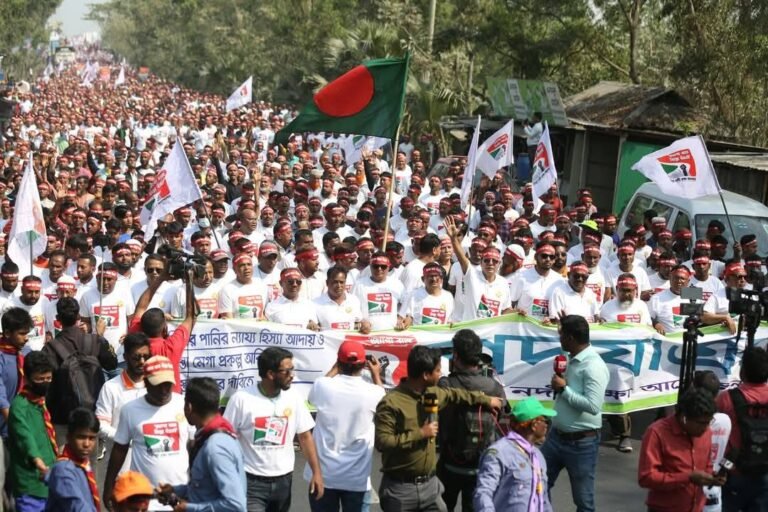The Teesta River Protection Movement Committee has launched a massive march demanding the implementation of the Teesta Master Plan and fair distribution of water resources under the slogan “Wake Up, Save Teesta.” The march has seen active participation from leaders and workers of BNP and its allied organizations, as well as people from all walks of life living along the banks of the Teesta.
The rally began at around 11:30 a.m. on Tuesday, February 18, 2025, with events kicking off simultaneously at 11 points across five northern districts. The march started at Teesta Bridge in Lalmonirhat and is set to end at the Kawnia Bazar in Rangpur.
In addition, a continuous 48-hour sit-in protest, public rallies, and marches began the previous day, Monday, February 17. BNP Secretary General Mirza Fakhrul Islam Alamgir inaugurated the protests at the Teesta Railway Bridge in Rangpur and Lalmonirhat.
This large-scale protest, one of the largest in recent history, has drawn hundreds of thousands of people from across the region, including the districts of Rangpur, Lalmonirhat, Gaibandha, Nilphamari, and Kurigram. On the second day of the protest, which continues today, February 18, rallies, marches, and cultural performances are taking place at all 11 points. Participants are also engaging in local music, dance, and sports to express their resistance.
Witnesses on the ground report that the banks of the Teesta River are filled with people from the early hours of the day, chanting slogans for the fair distribution of water and the implementation of the Teesta Master Plan. Many are holding banners, posters, and flags with slogans like “Wake Up, Save Teesta.” This evening, the concluding rally will feature a virtual address by BNP’s Acting Chairman Tarique Rahman.
The Teesta River, stretching 315 kilometers, spans 115 kilometers within Bangladesh. Although it is an international river, India has unilaterally built dams on the river to produce electricity and withdraw water for irrigation over 600,000 hectares of land, leaving Bangladesh with little water. This situation has led to unpredictable flooding and increasing damage to the region, harming the lives of local people year after year.
Experts and researchers on river systems and development believe that the only solution to protect the livelihoods of over 20 million people in northern Bangladesh is the implementation of the Teesta Master Plan. They emphasize the need for government action to protect agricultural land, prevent erosion, and preserve river islands, or else yearly damage from low water levels and flooding will continue to worsen. They also highlight the importance of securing fair water distribution and safeguarding the Teesta River.
If the Teesta is not protected, experts warn, not only will the lives and livelihoods of local people be at risk, but the region will also face devastating consequences due to climate change. Over 2,000 square kilometers of land surrounding the river is under threat. This is why the Teesta River Protection Movement Committee is leading the 48-hour campaign demanding the Teesta Master Plan and equitable water distribution.
During the inaugural speech on Monday, BNP Secretary General Mirza Fakhrul Islam Alamgir accused the Awami League government of failing to secure a single drop of Teesta water from India during the past 15 years. He criticized the government’s silence as India continues to build dams and divert water, while Bangladesh’s farmers, fishermen, and citizens suffer.
Mirza Fakhrul also addressed India directly, stating that for true friendship between the two countries, India must provide the Teesta’s water to Bangladesh and stop the border killings. He emphasized that Bangladesh seeks to stand on its own feet, receive its due share, and form a relationship with India based on mutual respect and fairness.
The movement’s chief coordinator, Asadul Habib Dulal, who is also the BNP’s Organizing Secretary for the Rangpur Division, stated that the people of Lalmonirhat, Kurigram, Nilphamari, Rangpur, and Gaibandha have long been victims of unequal water distribution from the Teesta. He pointed out that following the July revolution, people of Rangpur have awakened to the importance of the Teesta Master Plan. The ongoing 48-hour protest will spread awareness globally about the inequities related to Teesta’s water.



